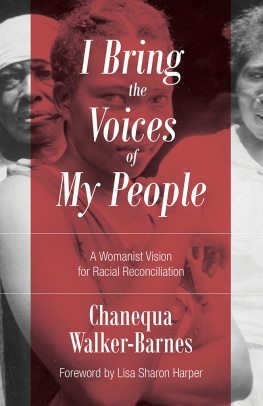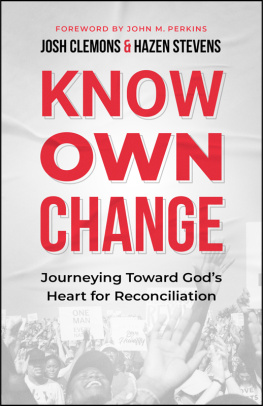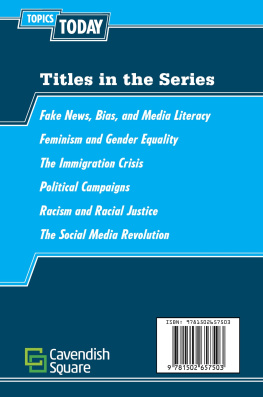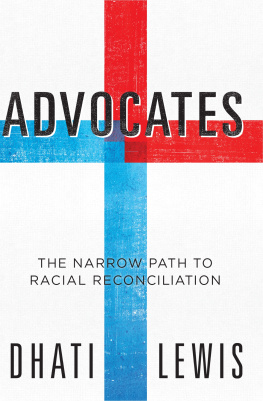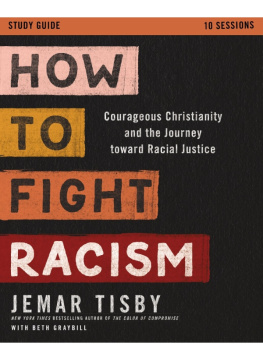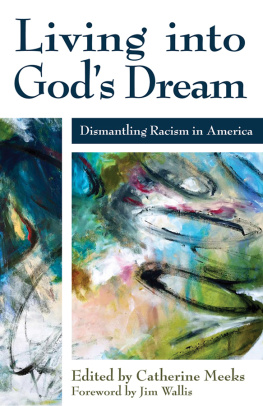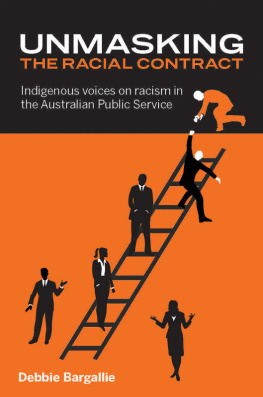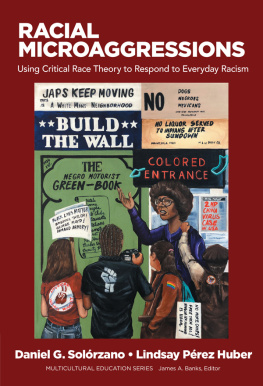Dr. Chanequa Walker-Barnes is one of the most courageous and prophetic voices I know! For far too long, theology and narratives that shape reconciliation have been co-opted by whiteness and used from an individualistic lens. But there is hope! In I Bring the Voices of My People, Dr. Walker-Barnes gives us a new theological lens birthed from the margins that provides a more holistic approach to justice and racial healing. This is a must read for anyone serious about reconciliation. I highly recommend it!
BRENDA SALTER MCNEIL, author of Roadmap to Reconciliation
Finally, someone is inviting us into reconciliation on black womxns terms. And who better than Dr. Chanequa Walker-Barnes, who spectacularly shows us in I Bring the Voices of My People that a message that centers black womxns experiences is a universally liberating message. I have experienced anti-black oppression in faith-based reconciliation contexts, and Dr. Chanequas words have invaluably supported my healing journey while also redirecting my steps toward justice practices that are not colonized by whiteness. Trust black womxn is a phrase that often gets thrown around with little behavioral follow-up. Dr. Chanequa, a true sage, is telling us how to trust black womxn on the topic and practice of reconciliation. Im following her lead and I hope you will too.
CHRISTENA CLEVELAND, Director of the Center for Justice and Renewal
Chanequa Walker-Barnes constructs a courageous womanist theology of racial reconciliation, drawing on a wide range of figures including womanist scholars, Alice Walker and her critical race theory, and Howard Thurman. What is so hopeful here, on a subject that has more often than not produced hopelessness and despair, is that Walker-Barnes puts forward a path that can lead to racial reconciliation, if not in my lifetime, then in the near, possible future. Walker-Barnes has offered us a challenge and an invitation; we should take them up by first reading I Bring the Voices of My People.
PHILLIS ISABELLA SHEPPARD, Vanderbilt Divinity School
Chanequa Walker-Barnes gives us new medicine, already tested through trials, and ready to address the sick ways Christians, especially evangelical Christians, think and talk about racial reconciliation. This beautifully written, sensitively personal, and analytically precise text may be the best book we have on racial reconciliation. Walker-Barnes, a womanist thinker of the highest order, has written herself into the required reading for every class that aims to consider race and reconciliation.
WILLIE JAMES JENNINGS, Yale Divinity School
A timely reminder of the role of context in determining not only when and where we enter but whose voices are missing from the work of repentance, a necessary component of reconciliation. In this Trumpian era, I Bring the Voices of My People is a must-read for anyone committed to naming, confronting, and dismantling White supremacy.
ANGELA D. SIMS, President of Colgate Rochester Crozer Divinity School
I Bring the Voices of My People awakens us to the need for radical reconciliation and stirs us to create a new reality that embraces and uplifts everyone.
GRACE JI-SUN KIM, author of Embracing the Other
With brilliant and unflinching commitment to black women, Dr. Chanequa Walker-Barnes tells the truth and writes a vision. We who truly long for racial reconciliation can leave this womanist work of liberation and love newly challenged and charged to take up our asymmetrical and particular work. Walker-Barnes rejoins black women, black people, women of color in mapping the journey of healing and salvation through confrontational truth-telling, breaking chains, leaving sometimes, and nurturing life through relationships among women of color. She calls the white among us to repentance and conversion, as well as to the salvific recognition that our moral injury will be repaired only as we reckon with the power of white supremacy in white lives. I am listening and am deeply grateful for this powerful and necessary book.
JENNIFER HARVEY, author of Dear White Christians
I Bring the Voices of My People is a trenchant and desperately needed critique of the evangelical racial reconciliation movement from an intersectional perspective. Centering a womanist analytic, Walker-Barnes demonstrates that an intersectional theology is essential for Christians of all racial and gender identities. Her in-depth analysis of the logic of white supremacy is also instructive for anyone working to further racial justice. This book should be required reading for all seminarians.
ANDREA SMITH, Coordinator, Evangelicals 4 Justice
I Bring the Voices of My People brings a womanist sledgehammer to the racism and racial reconciliation discussion in American Christianity. That largely male, often white, and uselessly polite conversation will never be the same, and thats a very good thing. In #Trumpvangelical America, we need truth-telling about white (Christian) supremacism and how to break its power. Chanequa Walker-Barnes establishes herself firmly here as an essential part of that effort. Her bracing, disruptive, uncompromising, truthful, womanist voice must be heard in these apocalyptic days.
DAVID P. GUSHEE, Mercer University
This book is the necessary disruption to what has become complacency and fatigue around this important work. Dr. Chanequa Walker-Barnes brings an infusion of fresh air that draws from the gripping story of her life experiences combined with an academic and intellectual curiosity that offers the potential of a powerful narrative of change. For serious students of reconciliation, this book now becomes one of the standard texts you must engage.
SOONG-CHAN RAH, author of The Next Evangelicalism
Chanequa Walker-Barnes offers an incredibly powerful analysis of racism and misogyny within the church and America. Her voice here and throughout her ministry is something all Christians need to hear in order to bring justice and reconciliation and to understand the work yet to be done. Her voice and her faith in God simultaneously provoke, humble, illuminate, and call us to action. Let us respond to her prophetic word.
JIM WALLIS, author of Americas Original Sin
If the true work of a teacher is to help her students know what is at stake in the critical conversations of our time, then Chanequa Walker-Barnes can rightly be called a teacher of the church in twenty-first-century America. If youve seen enough to know that the legacy of white supremacy cripples Christians capacity to build up communities of justice and reconciliation, I Bring the Voices of My People will help you avoid false hope, ask better questions, and find the partners you need on a faithful journey toward freedom.
JONATHAN WILSON-HARTGROVE, author of Reconstructing the Gospel: Finding Freedom from Slaveholder Religion
Some people are wise because theyre near to God. Others are wise because of their social location and lived experience. And yet others are wise because they have studied the Word of God and the world we live in. Chanequa Walker-Barnes is all of the above. But there are people who are wise but are not very kind. And there are people who are kind but not very wise. Dr. Chanequa shines bright because she is both wise and kind, and our world needs both right now. She makes you want to hear more, dream more, be more. As a womanist of faith, she invites us to believe in something seemingly impossible, trusting that we have a God who specializes in the impossible. This book is a gift to the world, and so is Dr. Chanequa Walker-Barnes.

